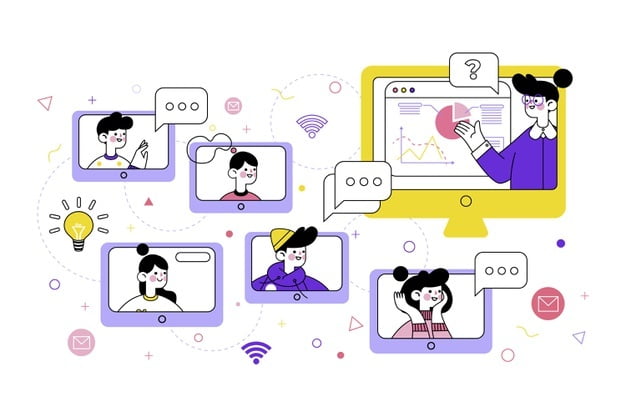How Does The Metaverse Impact The eLearning Industry Massively?

How Does The Metaverse Impact The eLearning Industry? – The metaverse is like a make-believe world where people can connect and play with each other and computer-created places that feel like the real thing.
This new technology is expected to greatly influence various areas like entertainment, business, and education.
Nowadays, lots of companies want to use metaverse development services to join this fast-growing technology. This article discusses how the metaverse is transforming the eLearning industry.
Read: How Microlearning Influence Makes A Better Learning Impact
What is eLearning?
eLearning means using technology to teach and help people learn. The eLearning industry has grown quickly in recent years because of the internet.
Many people prefer online education because it is easy to access and allows them to have more flexibility compared to attending classes in person.
The eLearning industry has made progress, but it still has some problems. It doesn’t have enough ways for people to interact and it needs to be more personalized.
What Is A Metaverse?
A metaverse is like a make-believe world on the internet where people can talk to each other and play around in pretend places. It is a idea related to science fiction, but it is becoming true because of technology getting better.
In a metaverse, people make virtual versions of themselves called avatars. They can do lots of things like talking to others, doing jobs, playing games, buying things, and going to events. It all happens in a realistic digital world.
Metaverses try to create a virtual world that connects smoothly, often using augmented reality (AR) and virtual reality (VR) technology. They can change how people socialize, work, and have fun in the digital world.
Companies and developers are working hard to make metaverse-like experiences. Many people are interested in this concept lately.
The eLearning Industry’s Position
The Metaverse is currently in the early stages of figuring out what its eLearning capabilities will be like in the coming years.
It means that it is probably at the same stage as when email was invented for the internet, compared to the instant messaging and texting abilities we have today.
However, big technology companies have already created tools and products, such as Microsoft Mesh, that are being used in real businesses and have the potential to change the eLearning industry.
In the near future, we predict that organizations will be cautious and observe to understand before they start using Metaverse-based eLearning.
Some schools for business have started using completely digital technology for their campuses.
Corporations will have to experiment and learn from their mistakes as they create their own ways of using the Metaverse to cater to learners’ needs and meet their expectations.
In the future, as technologies for learning and working together, like Facebook’s Oculus and its Horizon Workrooms, improve, eLearning with Metaverse will become very popular.
How Does The Metaverse Impact The eLearning Industry?
How can the metaverse impact the eLearning Industry you say. The metaverse can improve eLearning by providing users with more engaging, interactive, and personalized ways to learn.
1. Improves Accessibility And Interactivity
The metaverse in eLearning makes it easier to learn and allows for more interaction than traditional online learning. The metaverse allows people to use their virtual school from any place with the internet and talk and work with others at the same time.
This can help people with disabilities or those living far away to get an education and learn more easily.
2. Personalised Learning
The metaverse lets you have learning experiences that are made just for you and can be changed to fit what you like.
In the metaverse, people can create their own virtual worlds and learning experiences that suit their needs and likes.
This can make learning more interesting and helpful compared to normal online learning methods. The metaverse allows people to make a learning space that fits how they like to learn.
3. Enhances Collaborations
The metaverse allows people to work together and connect online in a better way for eLearning.
In the metaverse, people can collaborate on projects, join virtual events, and connect with others who are studying similar subjects.
This can make students feel included and give them the opportunity to make friends and collaborate with others, making the eLearning classroom a more exciting place to learn.
4. Immersive Experience
The metaverse lets you learn in a more intense way than regular eLearning. In the metaverse, people can enter a pretend world and communicate with their environment and other people.
This makes learning more enjoyable and easier to remember. This way of learning can help users remember information better and understand the material more.
Example of Metaverse in eLearning
The metaverse has many possible ways it can be used for eLearning. These include things like virtual classrooms, learning through games, using Virtual Reality for training, and having virtual events for finding jobs and making connections.
You can learn more information by using a metaverse consulting service provided by a trustworthy company.
1. Virtual Classroom
In virtual classrooms in the metaverse, learning is more practical and engaging than in regular online classrooms.
People can go to online classes, talk to others live, and be a part of the virtual world while in a virtual classroom.
2. Gamified Learning
The metaverse allows people to learn through fun games, where they can interact and feel like they are part of the game.
This way of teaching can make learning more fun and interesting, while still giving you important information and knowledge.
3. Virtual Networking and Career Fairs
The metaverse allows students and professionals to meet and talk with potential employers and other industry experts in a digital world.
This can be really helpful for people who live far away or in areas where there aren’t many services, and who can’t go to these events in person.
4. Virtual Reality Training
The metaverse lets people use Virtual Reality to train. By using simulations, they can practice real-life situations and improve their skills in a safe virtual world.
This kind of training is very important in healthcare, aviation, and law enforcement industries, where practical experience is necessary.
Difficulties And Opportunities of Metaverse in eLearning
The metaverse presents many exciting possibilities for the eLearning industry, but there are also some problems that need to be solved.
1. Costs
Another problem that the metaverse faces is the high cost of getting involved. The metaverse has the potential to have many advantages, but it can be expensive to create and keep up a virtual world.
This can make it hard for smaller eLearning companies to join the market and compete with bigger, well-known companies.
2. Regulatory Challenges
The metaverse in eLearning also has issues with privacy, keeping data safe, and protecting people’s ideas and creations. We must solve these issues in order to use the metaverse for education in a safe and responsible manner.
3. Technical Challenges
One of the main problems for the metaverse is the technology needed to run the virtual world.
This system needs to be able to transfer a lot of data, allow for instant communication, and be a safe and reliable environment.
Conclusion
The metaverse in eLearning can be improved by offering more engaging, interactive, and customized learning experiences in the future.
Although there are some difficulties to overcome, such as technical issues, costs, and rules, the metaverse offers great advantages for the eLearning sector, and its future seems promising.
As technology keeps improving, the metaverse will probably become a more crucial tool for teaching and learning.







